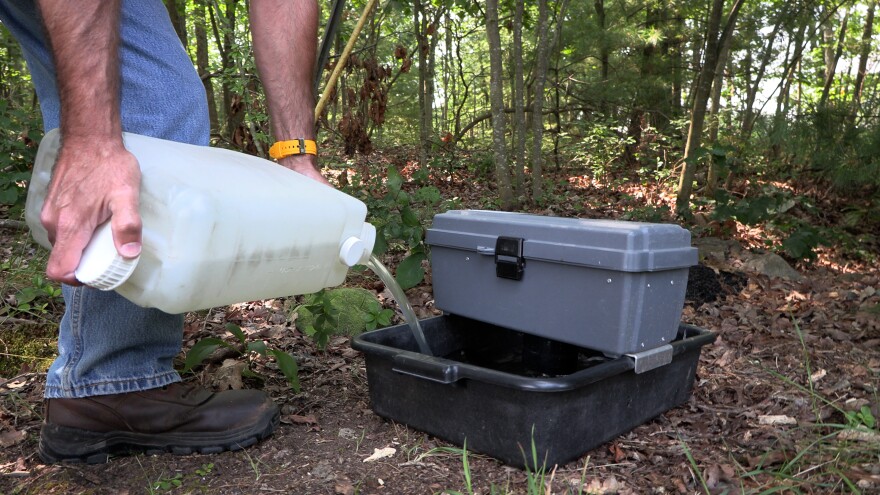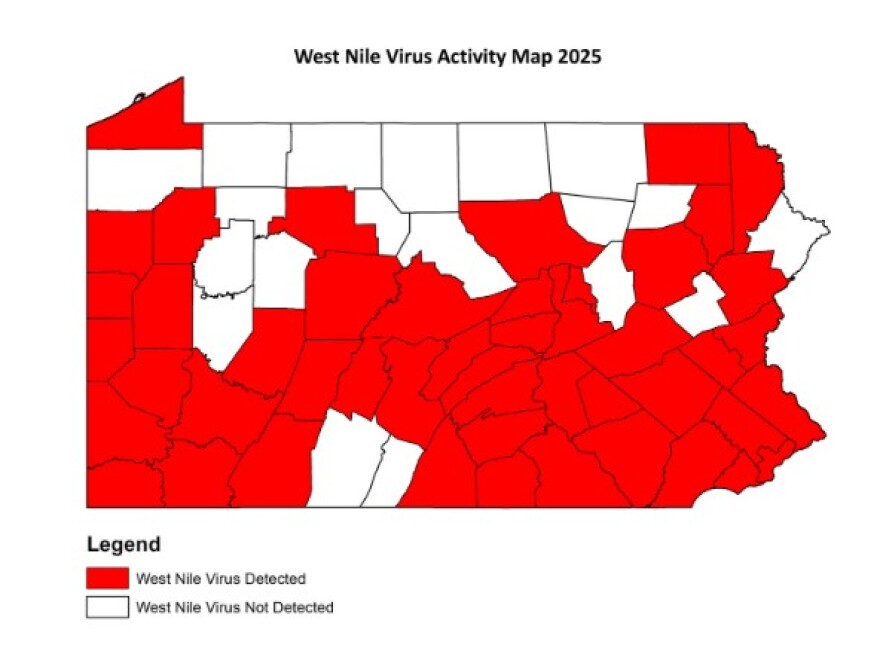Rocco Genovese sets up a trap at Robinson Park in Scranton.
It's one of 15 gravid mosquito traps that he places weekly around Lackawanna County.
“This is like a compost tea,” Genovese said. “So we put the solution in the pan. This has a fan and a collection unit, so the mosquitoes will come in and try to lay eggs in the pan. They get sucked up into the chamber because it can't fly faster than three miles an hour.”
As Lackawanna County’s West Nile virus coordinator, Genovese helps the Pennsylvania's Department of Environmental Protection (DEP) collect data on West Nile cases per county. The traps stay out for 24 hours. He collects the bugs, makes a rough estimate of how many mosquitoes he trapped and sends them off to the DEP for testing.

County collaboration with DEP to mitigate mosquito- borne illness
Putting out traps is standard procedure during Pennsylvania’s West Nile virus season, which started around April this year with the first positive sample and typically goes until the end of September or early October, when the first frost occurs.
“West Nile virus has been found in 52 counties across Pennsylvania,” said Jennifer Stough, an aquatic biologist supervisor for the DEP vector management program. “DEP monitors specifically mosquito populations, so we collect and test mosquitoes, and so far this year, we've had 754 mosquito samples test positive for West Nile virus.”

DEP handles the mitigation annually.
“West Nile virus occurs in Pennsylvania every year because we have the habitat such as artificial containers, tires, pits, that breed the mosquitoes that transmit West Nile virus," Stough said. "West Nile virus is typically a cycle between birds and mosquitoes, and we also have birds migrating up to Pennsylvania every year, bringing West Nile virus to the area."
West Nile is considered endemic to Pennsylvania, she said.
DEP collaborates with the state’s Departments of Health and Agriculture for the West Nile virus program. Stough said Agriculture monitors animal infections, DEP monitors positive mosquito samples and the Health Department records human cases.
There are two confirmed human cases of West Nile in the state so far.
“Every year, the Pennsylvania Department of Health records approximately 35 human cases across all 67 counties,” said Neil Ruhland, Pa.’s Department of Health deputy press secretary.
Counties receive DEP grants for mosquito surveillance and what Stough called "source reduction events."
“Basically that's using all the tools in your toolbox to combat mosquito populations, whether that be surveillance of all these habitats, looking for mosquito larvae, as well as educating the public on how they can dump, drain, treat habitats on their property,” she said. “A lot of tire collection events, other habitat reduction events and counties do a lot of larval control. We will also do adult control to reduce the number of infected adults in the environment. All these things combined together reduces the transmission of mosquito borne disease in Pennsylvania and allows the public and visitors to recreate and enjoy outdoor spaces.”
West Nile cases low, Jamestown Canyon cases high
Lackawanna and Luzerne Counties both have less West Nile cases this year than they did last year. Genovese said there were eight positive cases in mosquitos in Lackawanna County as of Aug. 4.
Keith George, Luzerne county’s mosquito borne disease control program coordinator at the Luzerne Conservation District, said his team has recorded 19 positive cases this year, compared to 50 at this time last year.
“This year, we've been getting plenty of rain, so I think it spreads the birds and the mosquitoes out that are carrying the virus and tends to bring down that density of the virus,” George said.
However, the wetter than normal conditions are good for spreading another mosquito- borne virus, Jamestown Canyon virus.

“These are typically floodplain species,” George said. “They lay their eggs in leaf litter and soil in floodplains, and then when those floodplains fill up or woodland pools with water, the eggs hatch. They breed, they emerge. It's actually very problematic in Luzerne County because of our disturbed and unique topography of our floodplains."
For the past three years, Luzerne County was the first in the state to detect Jamestown Canyon.
"We are up to 15 positives this year, where last year, at this time, we only had one positive," George said. "During dry periods, we get an influx of West Nile virus. During the wet periods, we get more of the floodplain species. We get more Jamestown Canyon virus.”
There’s 15 recorded cases of Jamestown Canyon virus in Luzerne County so far. At this time last year, there was only one recorded case. It’s the state's highest case count, according to DEP data from July 28.

George sets 30 gravid traps around Luzerne County per week, mostly concentrated in the Wyoming Valley. The county sprayed for Jamestown Canyon in Luzerne County’s floodplains.
“We're using the biomist 3+ 15,” George said. “This is an ultra low volume spray, uses a very small concentration of product. It breaks down quickly in an environment. It doesn't have any residual that lingers. There's no significant risk to pets or people."
They spray in the evening hours.
"We like to hit them when they're most active and out in the environment, and it's also the time where a lot of your beneficial pollinators are not active, so we're not actually hitting those insects,” he said.
The two mosquito- borne viruses have similar symptoms when contracted by humans. The main difference between the two is that West Nile is transmitted through birds, while Jamestown Canyon is spread through mammals, mostly deer.
Precautions against mosquito- borne illness
George suspects there are actually more human cases of West Nile than what’s reported.

“Your typical person would be asymptomatic or just have mild symptoms,” George said. “Now, a mild case would be flu-like symptoms. You might get a fever, you might get fatigue, headache, body aches. I feel like a lot of these cases probably go under reported because they just don't seek medical attention. Now, a more severe case, you do have a very small percentage, that may get a neuro-invasive case, where you might get encephalitis in the brain, high fevers, and in rare instances, even death. It's no need for alarm because most people are asymptomatic.”
The Centers for Disease Control found that 1 in 5 people infected develop a fever and other symptoms, while only 1 in 150 develop a serious illness that could become fatal.
DEP’s best advice is to prevent mosquito bites.
“Residents should really remain vigilant, because West Nile activity will continue, and it's important to take all the necessary precautions to prevent mosquito bites,” Stough said. “Residents should be wearing repellent. They should be wearing long pants and long sleeves if they're outside at dusk and dawn, and a combination of those things is going to reduce your risk from getting sick in the first place.”
She, again, urged residents to remove standing water from personal property to prevent the virus from spreading. Just a bottle cap of water can breed mosquitoes, she said.
“A bucket lying around can breed mosquitoes, an unkept bird bath, children's toys, even the black corrugated downspouts that are often at people's homes, each one of those slots holds water and can breed mosquitoes," she said. "The saying is, ‘if you're feeding them, you're breeding them.’ If you're getting bit, there's something probably in your yard or your neighbor's yard that's holding water consistently and breeding mosquitoes. So just remaining vigilant and checking your own properties would be a great help to our program.”




